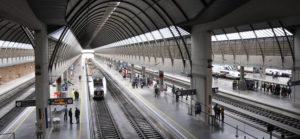 Santa Justa Station, Seville, Spain: From a high ceiling glaring circles of light stare down at rectangles of dark tiles where an ant-bed bustle of jacketed men and women, young and old, push and pull rectangular cubes on wheels, some with backpacks or shoulder bags as well. They meander in and out of malformed lines, some with confident purpose and direction, others seemingly lost, blind mice feeling their way toward one ticket counter, snack shop, gift shop, bookstand, café, or advertisement display to the next, never satisfied.
Santa Justa Station, Seville, Spain: From a high ceiling glaring circles of light stare down at rectangles of dark tiles where an ant-bed bustle of jacketed men and women, young and old, push and pull rectangular cubes on wheels, some with backpacks or shoulder bags as well. They meander in and out of malformed lines, some with confident purpose and direction, others seemingly lost, blind mice feeling their way toward one ticket counter, snack shop, gift shop, bookstand, café, or advertisement display to the next, never satisfied.
A large group of reluctant gray hairs rumbles in, pausing, awaiting the command of some missing leader, searching out rest one by one on connected rows of metal seats. The women are wearing coats and scarves, the men in jackets and sweaters because the March mornings are still chilly in Seville. There is a muffled chatter full of guttural slurs and lisping aspirations. The women are asking the men if they are sure which train they are supposed to take; and the men, some silenced by uncertainty and doubt, search through bifocals toward black schedule boards where arrivals and departures are spelled out in orange pixeled letters and numbers if only the characters weren’t so small. It is clear that after years of patience and trust in the men they once reluctantly followed, the women have finally arrived at an uncomfortable conclusion of distrust.
They close their eyes in anxiety and fatigue and think of their sons in some distant place in whom there is still some faint glimmer of hope. Giant clocks on either side of the station nave glow with hands that crawl slowly through the sludge of persistent time. Dozens of passengers eventually herd out onto the platforms to be swallowed by trains and slithered away toward unimaginable destinies.
James Miller Robinson lives in Huntsville, Alabama